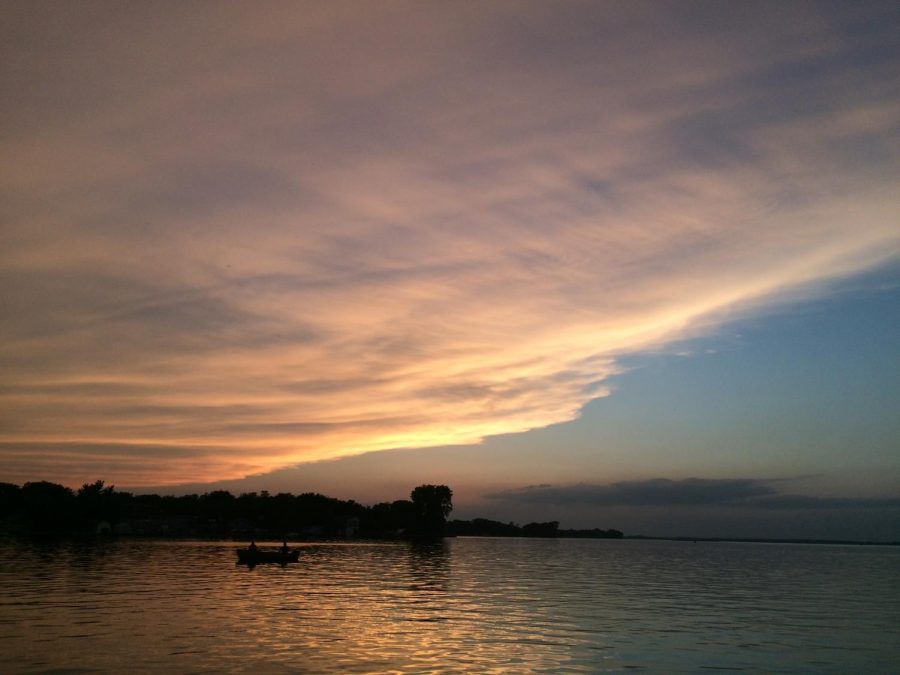Opinion — Why young people leave their small towns
LITTLE BAY — The sun rises above two fishermen on Little Bay de Noc, painting the water shades of yellow in my hometown of Gladstone, Mich. With endless information at our fingertips, Gen Zers now more than ever have been itching to escape their small towns to see what life has to offer them elsewhere.
October 13, 2022
When I was in high school, all anyone ever talked about was getting out of our small town.
Gladstone, located along the shimmering shores of Little Bay de Noc in the Upper Peninsula of Michigan, houses under 5,000 people and has less than ten restaurants to its name — half of which are chains.
The busiest place in town seems to be the Holiday Gas Station located on Ninth Street, which is the city’s main drag. Due to its popularity, my mother has jokingly nicknamed Holiday the “Gladstone Mall,” considering how often we frequent the gas station.
Whenever I think about Gladstone, I am reminded of the song “Small Town” by John Mellencamp. Like him, I am humbled by small-town life and all it has blessed me with in the first two decades of my life.
Gladstone has afforded me the luxury of comfort, family and community, which are qualities that I fear no other city will ever be able to replicate. I can walk the downtown streets with ease, stop by an old friend’s house without warning or attend a high school sporting event and be greeted with love.
Why, then, did my classmates and I have such a strong desire to leave Gladstone behind?
The desire to leave a small town seems to be a universal experience. Many young adults cannot wait to escape the confines of the only life they have ever known. However, reasons for leaving that life behind extend well beyond simply wanting a change of scenery.
The digital age that came with the turn of the century has granted billions of people access to the internet. This fact has had an incredible impact on the spread of information, whether it be news, opinion or any other form of digestible material.
Considering that Gen Zers were born in the early 2000s, we have been oversaturated with media content, via the internet or television, since the day we were born. We have explored life, experienced cultures and found ourselves by vicariously living through others online.
With endless information at our fingertips, we have discovered ways of life that generations before us very well may have never known to exist.
It makes sense, then, that we would want to abandon our homes and explore the various cities and cultures that the internet has shown us to exist. The world has so much to offer me, so why would I limit myself to the Upper Peninsula when I know opportunity waits for me elsewhere?
With my graduation from NMU fast approaching, the state of America’s job market has been on my mind. The ability to secure a job, especially for those who have spent thousands of dollars on a bachelor’s degree, is the top priority for college graduates.
Considering that the job market is much bigger in large cities than in more rural parts of America, it should not come as a surprise that many college graduates flock to metropolitan areas after earning their degrees. Not only are there more openings, but job variety allows recent graduates to flex the hyper-focused skillset they acquired in college.
The opportunity extends beyond work life as well. When leaving a small town, the ability to meet people with different perspectives, beliefs and lifestyles than your own skyrockets. These people will undoubtedly challenge your view of the world, which is extremely valuable to discovering a sense of self.
Life is too complex and short for definitives, especially when it comes to a way of life. We need to remain curious.
According to Abraham Maslow’s Hierarchy of Needs, physiological needs, safety needs and a sense of love or belonging must be satisfied before a human can achieve esteem and self-actualization. These top two tiers are what makes life enjoyable, allowing an individual to become the best possible version of themselves.
Thankfully, small-town life has allowed me to satisfy the first three tiers. I have learned how to look after my basic needs. I have acquired the education and the work experience needed to feel safe in my current disposition. I have always felt a sense of belonging in my hometown.
Esteem and self-actualization, however, require me to step outside of my comfort zone in Gladstone.
I have realized that I enjoy life when I am lost. Not lost in the sense that I have no direction but lost in that I must figure out how to use the tools I have acquired through the life I have lived so far.
I need to solve puzzles, and Gladstone is one that I have already completed.
Yet, not everyone feels as I do. The desire within teens to escape small-town life is not a universal experience. Not everyone needs to leave their hometown to reach Maslow’s top two tiers.
A majority of the adults in Gladstone were born and raised in the area, with a few maybe relocating from other areas of the U.P. To find someone who moved to the city from out-of-state is an oddity, and I would often wonder how they discovered my small town when searching for a new home.
Whenever asked why someone chose to stay in the area, given answers are typically the same. Many will first praise the beautiful scenery before saying it is a great place to settle down and raise a family. Gladstone also accommodates a minimalist lifestyle that many seek out.
With all of that, I agree. It is called “God’s Country” after all.
And while my desire to leave Gladstone and life in the U.P. behind stays strong to this day, I do not plan to leave forever.
I would miss driving down M-35 early in the morning, tracing Little Bay de Noc with my vehicle as the morning sun paints the water in shades of yellow and orange. I would miss my childhood home, which is protected by a lush forest just on the outskirts of town.
What I would miss the most, though, is the family that has made Gladstone truly feel like home.
At a young age, I remember my mother telling me that “Lights” by Journey was written about Gladstone. While the song was actually written about Los Angeles, my mom was right in that the lyrics describe my love for the small town to a tee: “When the lights go down in the city and the sun shines on the bay, I wanna be there in my city.”
Whenever the song plays, I am sure to remind people that it was written about my city, Gladstone.
Editor’s Note: The North Wind is committed to offering a free and open public forum of ideas, publishing a wide range of viewpoints to accurately represent the NMU student body. This is a staff column, written by an employee of the North Wind. As such, it expresses the personal opinions of the individual writer, and does not necessarily reflect the position of the North Wind Editorial Board.




























